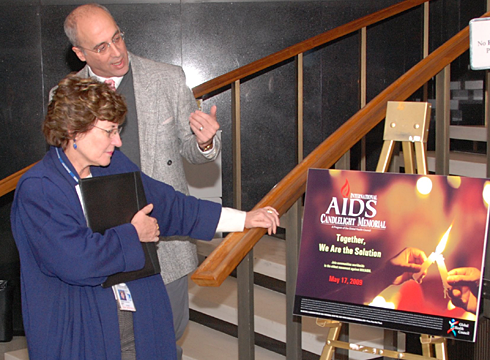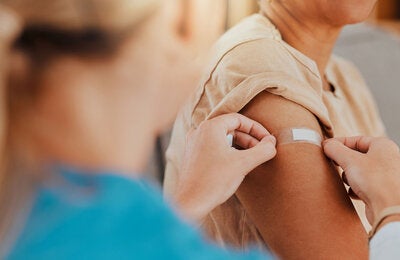Washington, D.C., December 2, 2008 (PAHO)—Three million people were living with HIV in the Americas as of 2007—the latest year for which data are available—up from 2.7 million in 2001. This represents a "leveling off" of the epidemic in the Western Hemisphere, a top Pan American Health Organization (PAHO) expert said Monday at a commemoration of World AIDS Day, Dec. 1.
"We do see progress in our region," said Dr. Gottfried Hirnschall, head of PAHO's regional HIV program. "But there is still an unacceptable number of new infections, and mortality has not decreased as expected."
Approximately 214,000 people contracted HIV in the region in 2007, Hirnschall said, or about 586 people per day. Some 100,000 died from the disease the same year. "That number should be lower, given the availability of treatment," he said.
In Latin America and the Caribbean, PAHO estimates that 62 percent of people who need antiretroviral treatment (ART) are receiving it. Brazil comes close to having 100 percent ART coverage, and being a large country, its rate of coverage boosts the regionwide average. However, in many countries coverage is much lower than the regionwide average. Prenatal testing for HIV in pregnant women is about 50 percent regionwide, and in many countries, it is much lower. Only 36 percent of pregnant women living with HIV receive ART.
"This is really an unacceptable situation," said Hirnschall.
Compared with men, the proportion of women with HIV has increased over the years, but this trend also is leveling off, said Hirnschall. In the Caribbean, half of people with HIV are women; in Latin America, the proportion is one in four.
"In Latin America and the Caribbean, we should speak of epidemics, not one epidemic," said Hirnschall. "In the vast majority of countries, there are concentrated epidemics in specific populations rather than a generalized epidemic." The most at-risk groups are men who have sex with men, transgender individuals, sex workers, injecting drug users, incarcerated populations, vulnerable children and youths, and ethnic minorities.
Stigma against people with HIV and vulnerable groups remains a problem, compounding suffering and complicating prevention and treatment efforts.
Hirnschall said some of the major challenges of HIV in the Americas today are:
- Scaling up and targeting prevention efforts at groups where transmission is occurring
- Strengthening health systems and "mainstreaming" HIV efforts into them
- Mobilizing other sectors—for example, education—to build a multisectoral response
- Improving resource mobilization in Latin America and the Caribbean, for example, from the Global Fund for AIDS, Tuberculosis and Malaria
- Improving coordination among United Nations agencies and increase civil society participation in HIV efforts
- Translating new evidence into policy and program action.
Hirnschall cited a recent study published in The Lancet that suggests that treatment with ART at an earlier stage of infection could boost prevention.
"We really have to focus on prevention," he emphasized, "or the number of new people infected with HIV will always exceed the number who are getting treatment."
To highlight new approaches to communication as a tool for HIV prevention, PAHO is hosting this week and through Dec. 12 an exhibit of selected artworks from the First International HIV/AIDS Cartoon Exhibition, an initiative of the Ministry of Health of Brazil and the Memorial Institute of Graphic Arts of Brazil. The competition selected 300 cartoons from among 1,200 entries from 50 countries; 60 of the selected artworks are on display at PAHO. Also on exhibit are 200 HIV public service announcements from the "VIHdeo America" collection of television spots from 24 countries.

PAHO Director, Dr. Mirta Roses, at the art exhibit being hosted at PAHO headquarters (Photo Sonia Mey-Schimidt/OPS).
PAHO, founded in 1902, works with all the countries of the Americas to improve the health and quality of life of their peoples. It also serves as the Regional Office for the Americas of the World Health Organization (WHO).
For more information please contact Donna Eberwine-Villagrán, Public Information, Knowledge Management and Communication, tel 202 974 3122,



